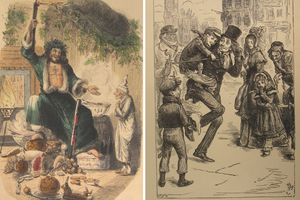Grounding Your Children in Good Books Will Change Their Lives
The stories and characters they encounter in books will stay with them throughout our lives.

One of my goals for my children’s primary education has always been to prepare them to read the Great Books.
To this end I have spent years exposing them to literature from the list, “The Thousand Great Books,” which John Senior compiled in the appendix of his work The Death of Christian Culture.
My children’s exposure to good books begins with nursery rhymes, walks them through the world of Peter Rabbit, and delves into the fairy stories of Andrew Lang and the d’Aulaires’s telling of the myths. As they read independently, they experience the great children’s classics such as Heidi, Black Beauty and Treasure Island. They explore the world with Jules Verne and go to war with the boys of G.A. Henty’s historical novels. They encounter moral lessons in the works of Louisa May Alcott and find friends in the stories of Gene Stratton-Porter.
This is all to prepare them to encounter the great works of adult literature and further the Great Books of civilization. For myself, the list has led me to read books that I missed in my own education.
While my family has found many rich experiences in Senior’s list, he consciously limited the book selection to those that were more than 100 years old. So, I was very enthusiastic when I heard about a new book by Cheri Blomquist, Before Austen Comes Aesop: The Children’s Great Books and How to Experience Them. I underlined nearly every point Blomquist makes in her introduction, as she explains the importance of the Great Books of Western civilization for a well-rounded classical education. But she also explains the need to lay a foundation in the “great works of children’s literature” as “the primary focus during the grade-school years (including most of high school” since “they actually support and lay the groundwork for the future introduction of the Great Books canon.” She emphasizes “that children’s literature is every bit as rich, meaningful, engaging, and beautiful as adult literature.”
In my own experience of discovering books with my children, I have found all of this to be true.
Before Austen Comes Aesop, which Blomquist describes as a “literature resource,” contains lists of books from the different time periods of literature: the Ancient world, the Middle Ages, the Protestant Reformation, the colonization of New England to the mid-19th century, the “First Golden Age” of children’s literature, the Great Depression through World War II, the “Second Golden Age,” and noteworthy books of the late 20th century.
In the lists for each era, Blomquist flags books as “foundational” and “important.” Further, she has an alert of “Parents Cautioned!” regarding mature content that should be evaluated before giving to a child to read. She gives the reading level of each book and the age that it might interest and for many of the books explains why they are important.
In the later section of the book she outlines through a “reading adventure” for different age groups to help a child get the most out of the books they read. And the best part, for booklovers such as myself, might just be the compiled list of books in the Appendix.
My children and I have spent the summer reading books listed in Before Austen Comes Aesop, many of which we had never discovered before. Blomquist has given me the confidence I needed to explore newer works of literature without worrying about the content. While my children are not always limited to the great and good books of children’s literature in their reading (The Magic Tree House series has done wonders for us to boost the confidence of a developing reader), even at their young ages they find great value in reading things that are written well with themes that teach them truths about human experience.
Knowing the truth, about God and ourselves, is the ultimate reason for reading literature. Through reading good books, we come to understand the human condition in all of its fallenness and the potential for redemption.
The stories and characters we encounter in books stay with us throughout our lives. Some we relate to on a personal level; others help us understand our differences; still others make mistakes so that we don’t have to. What our children learn in the good books will help them be better people for the rest of their lives.
- Keywords:
- great books
- reading

















